Children
Deanna and Zoey learn to live with Rett
May 20, 2021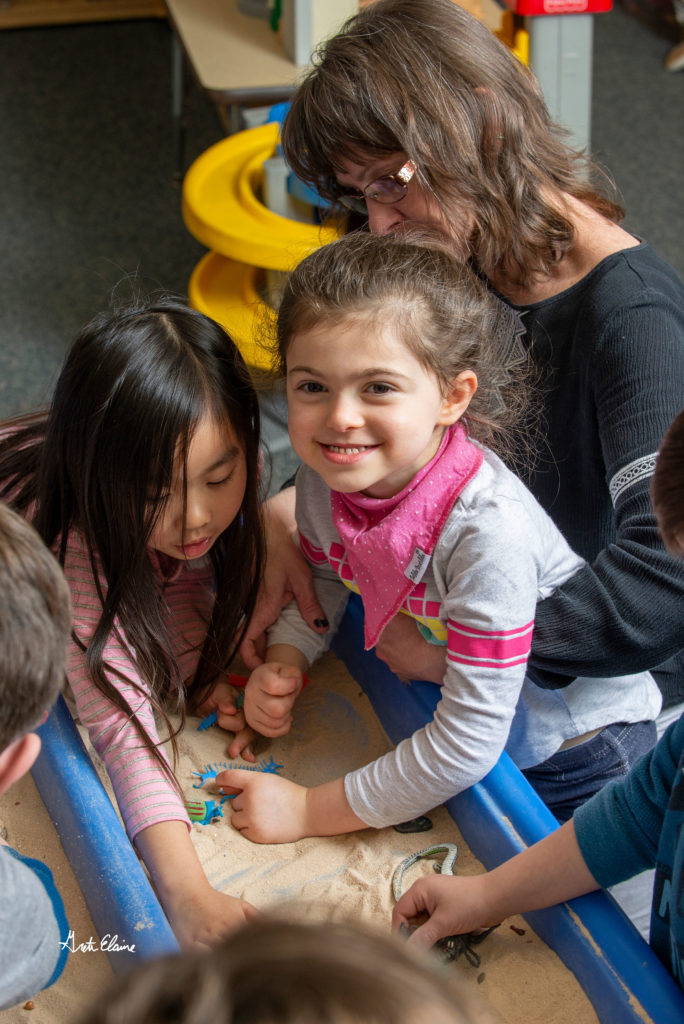
Zoey Adair
Zoey and some of her preschool friends play in a sandbox in a photo from 2019. Zoey has learned many different skills at Schreiber as she and her family deal with her diagnosis of Rett Syndrome, a rare genetic disorder.
Deanna Adair has been a Schreiber physical therapist for five years. Her daughter Zoey attended Schreiber’s S.T.A.R.S. preschool and Circle of Friends Academy and is now in kindergarten. Zoey also receives therapy services. She has Rett Syndrome, a rare neurological disorder affecting mostly girls. Individuals with Rett appear to develop normally until 6-18 months of age, after which they go through a regression and lose acquired skills. Zoey was diagnosed at 21 months of age. She began to display gross motor and language delays by 9-10 months of age, and began to lose her fine motor skills around 18 months.
Zoey, who will turn 7 in July, is unable to walk independently or talk, and has lost the ability to use her hands functionally or chew food. She communicates using an Eyegaze device and a yes/no board. She eats pureed foods and drinks thickened liquids, and has a feeding tube for supplemental hydration.

She also has scoliosis and obstructive sleep apnea, for which she uses a BIPAP machine. Rett Syndrome is not a degenerative disorder (brain cells are intact), and has been shown to be reversible in a lab setting, indicating that it may be curable in humans.
Deanna recently wrote a Facebook post to mark the fifth anniversary of Zoey’s diagnosis. She agreed to share it here.
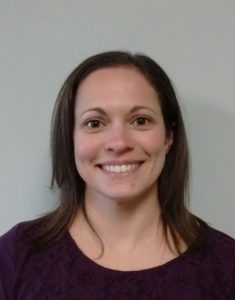
I can’t believe it’s been five years since we received Zoey’s Rett Syndrome diagnosis. It was Friday the 13th. I was on my way from my old job to pick her up from day care at Schreiber and answered the phone call as I was getting on the highway. I thought they were going to tell me that further testing was needed, because they only agreed to test for Rett “for peace of mind,” since I asked, but that’s not how it went. They gave us an appointment at the CHOP Rett clinic three days later and told me not to look it up on the internet. Guess what I spent the entire weekend doing?! After two days on the couch, I had to pick myself up and do what needed to be done for our girl. After all, she was the same sweet, beautiful little girl she had been before the diagnosis.
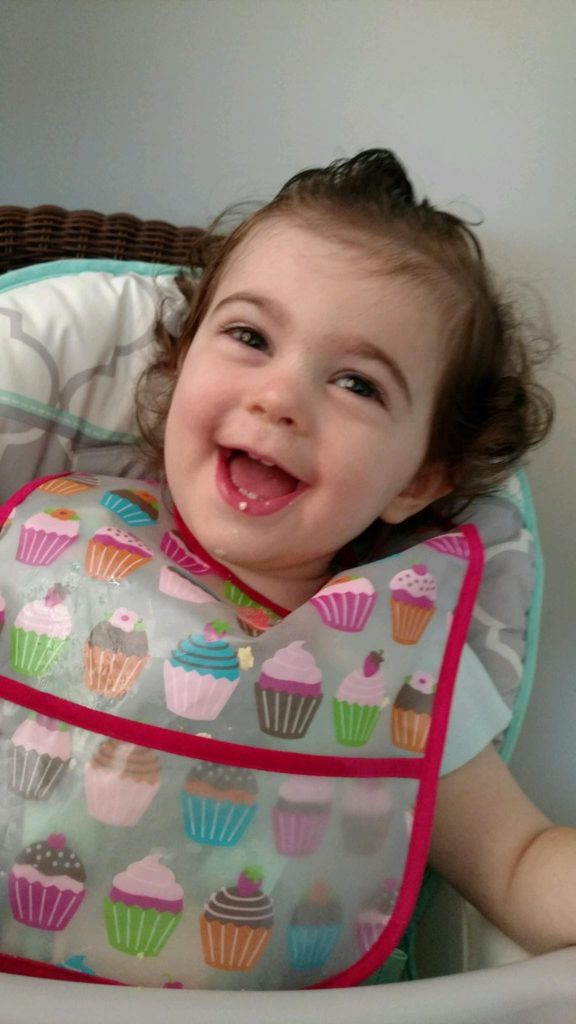
We have learned a lot since that day, and we are determined to give her the best life possible and find ways for her to learn and experience as much as she can. She is such a sweetheart, has a sense of humor, is smart, works hard, and is just a happy girl. Life has not been easy, and we have our tough times, but she is worth it!
Lately, we have been working on things like a special needs trust for her future, which can be overwhelming to think about, and the older she gets without there being a treatment or cure, the harder it is, too. But our girl has had an amazing year in kindergarten, having fun and learning to read and write using eye gaze, and we are so proud of her!
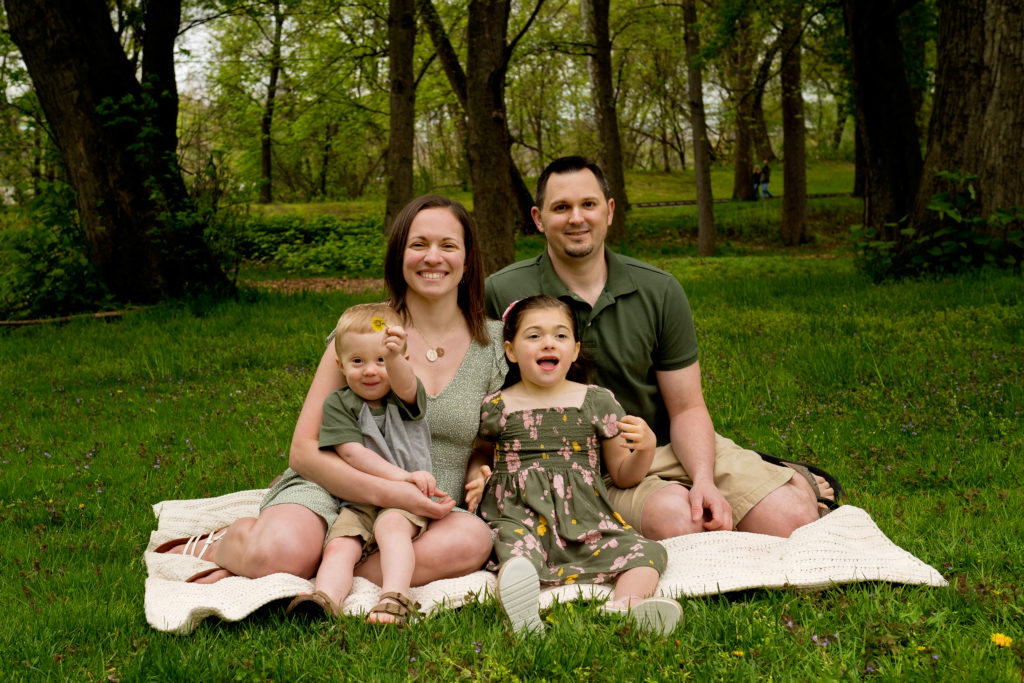
Preschool moms donate books to Schreiber
April 21, 2021The idea started from chat between two Schreiber S.T.A.R.S. Preschool moms. Jennel Roberts and Michelle Miller are both independent consultants for Usborne Books and More, a company that distributes a wide array of books, including children’s books.
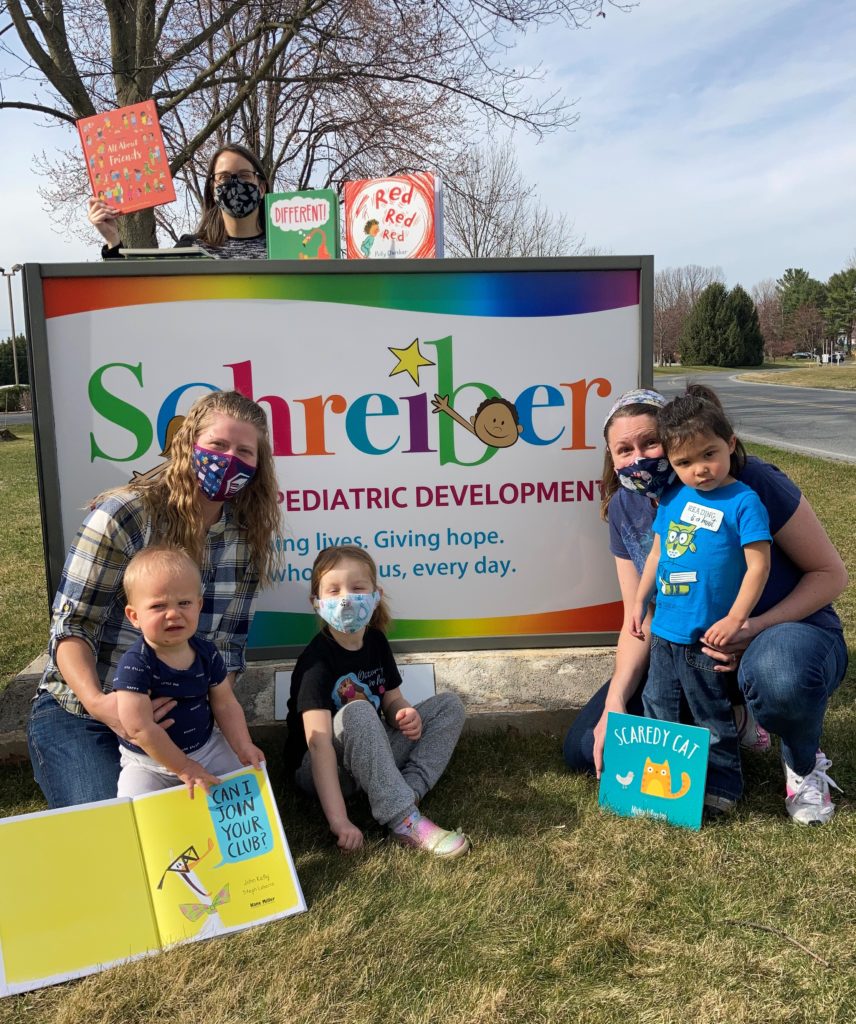
Michelle Miller, left, and Jennel Roberts recently visited Schreiber with their S.T.A.R.S. preschoolers to deliver $780 in donated Usborne books to Schreiber.
Jennel wanted to host a party to invite guests to come and buy books. And she wanted to add a charitable spin. People could either shop for themselves, and Usborne would match 50 percent of sales with donated books. Or book shoppers could make a direct donation, which Michelle then used to buy more books.
The result: The friends delivered four boxes of books, worth a total of $780, that are now being used in Schreiber’s therapy and preschool programs. The gift arrived in plenty of time for the April 23’s World Book Day, a global celebration of authors, books and reading.
Michelle is a two-time S.T.A.R.S. mom. Her daughter Amy is a preschool grad, and a younger daughter Adrienne is currently enrolled.
“I’m a TSS (therapeutic support staff), and my client received services from Schreiber,” Michelle said, balancing her youngest, 1-year-old Tommy, on her lap. “We love Schreiber, and the preschool being inclusional was important to us.”
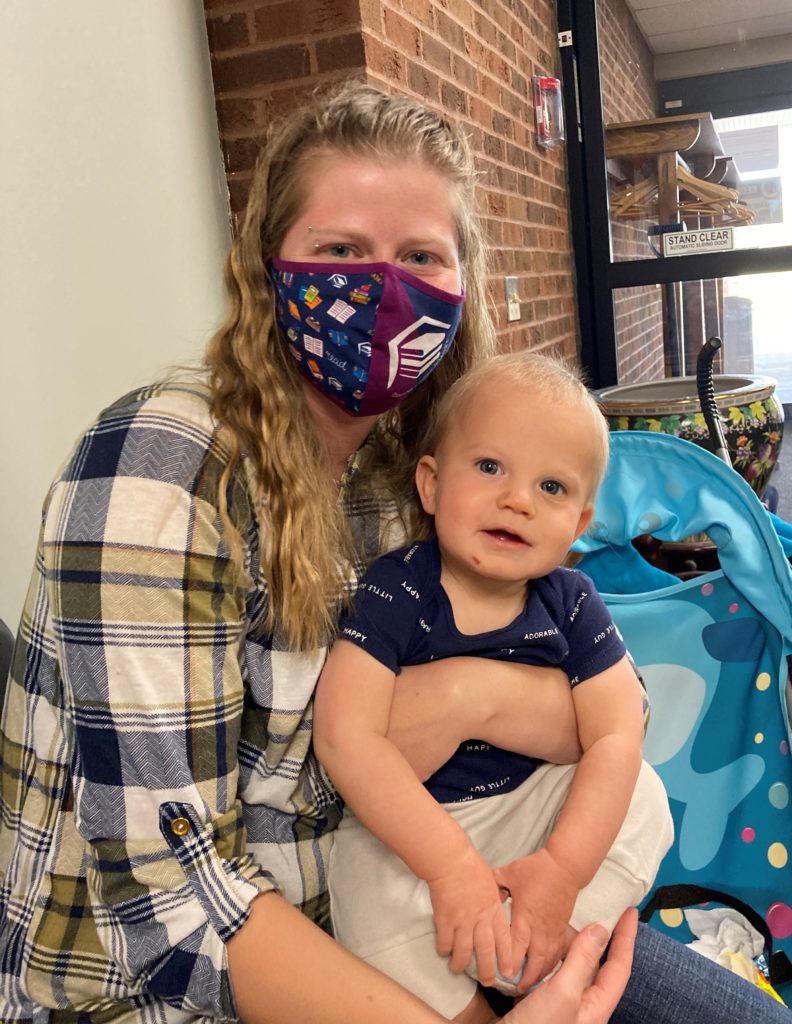
Schreiber’s inclusional or reverse mainstream philosophy places preschoolers with special needs in the same classroom as their typically developing peers.
“I wanted my kids to be around kids who were different from them,” she said. “I want them to learn to be an advocate and a voice for those kids in elementary school.”
Michelle has been an Usborne independent contractor for five years. You can find her online sales page here. She has an ongoing promotion now where once she reaches $250 in order, 50 percent of the retail total is donated to Schreiber as free books.
She also runs regular reading and literacy challenges for parents who follow her on Facebook. You can ask to join the group here.
“These are great books for all ages, even some for young adults,” Michelle said. “The philosophy of the company is to not talk down to kids, to treat them as inquisitive and create engaging, interactive books.”
Building inquisitive, engaged readers at Schreiber. We can’t think of a better way to celebrate World Book Day.
First steps on a journey of recovery
December 18, 2019Four-year-old Jack Teyssier works through a series of exercises each week at Schreiber. His physical therapy sessions include strengthening and stretching for his lower left leg, some core work and some myofascial release by Schreiber therapist Lisa Stachler-Volk.
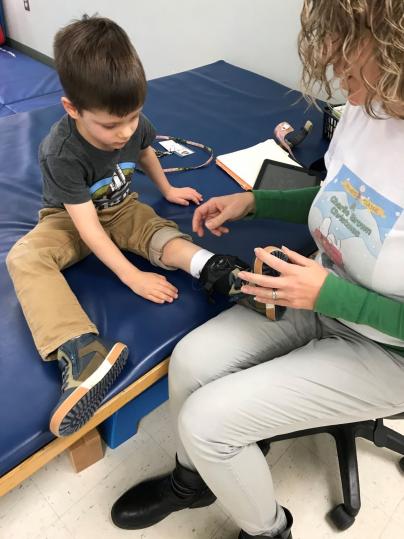
Jack Teyssier, 4, finishes his physical therapy session with Schreiber PT Lisa Stachler-Volk.
It’s hard to tell what exactly Jack is dealing with until Lisa puts some kind of black brace-like device on Jack’s left ankle.
Jack has one of the rare disorders therapists at Schreiber see from time to time. In this case, he has myofibromatosis, a condition that causes benign tumors to grow anywhere in the body.
According to the National Organization for Rare Disorders, most cases occur in young children and there can be a familial link. Jack’s mother Kara Teyssier said she had them on her leg and back; they were surgically removed when she was a baby. Her youngest son, Levi, also had one inside his cheek that was treated through chemotherapy and surgery.
It hasn’t been so simple with Jack.
“He has quite the medical history,” Kara said.
While Jack did his exercises with Lisa, Kara went through the list of Jack’s issues.
When he was born, he was diagnosed with pyloric atresia, an obstruction in the part of the stomach that leads to the small intestine. Doctors at Children’s Hospital of Philadelphia repaired that through surgery, and they also found the first his benign tumors.
At one month, Kara said she and her husband, Ben, noticed Jack’s left foot was droopy. Another of these tumors had developed and was pressing on a nerve in his leg.
So Jack went through a course of chemotherapy, and Kara said most of the tumors have shrunk or disappeared. But the one in his leg had caused permanent damage to the nerve. and Jack had lost the ability to flex his foot normally.
From the time Jack was 7 or 8 months old, Schreiber therapists began working with him at home. That lasted about a year and a half, until the Teyssiers decided he was doing well enough with a brace on his left leg.
Over time, though, his doctors wanted to try and restore more flexibility in his foot. They recommended another surgery, this time to take a tendon from the bottom of his droopy left foot and move it to the top of the same foot.
That surgery happened in March 2019, and he started coming to Schreiber for physical therapy in April.
Lisa has worked on helping him walk better. Before the surgery, the brace kept his foot in a neutral position to help him walk. But he couldn’t flex his foot at all.
“The surgery helped,” Lisa said. “He couldn’t lift his foot at all when we started. Now, he can keep his foot in a neutral (not drooping) position without the brace.”
She has been working on improving the strength of his left leg; his foot tended to roll and he would walk on the side of his foot. He’s also better able to flex his foot up and down. How far he will eventually progress isn’t known.
He can run around and play just like any other 4 year old. He rides a bike without training wheels. When he walks, you can’t even tell he has any kind of a problem, Kara said.
“We have been pleased with his progress,” Kara said. “At home, he doesn’t even wear the brace a lot of the time. Long term, we don’t know if he’ll have to keep the brace. Time will tell what happens as he continues to grow and get stronger. We’re blown away with how far he’s come.”
Schreiber volunteer all about the Duckies
July 24, 2019
Melissa’s connection to Schreiber goes back to the beginning of the Lititz Chocolate Walk.
Chocolate Walk started in 2001 as a project of the Kiwanis Club of the Lititz Area. Melissa was a member then (and still is today). One of the Lititz club’s founders was Ralph Sherrif, who also happened to be a Schreiber board member.
“When we did the first one, we were talking about where the money we raised was going to go,” Melissa said. “It was because of Ralph that we decided Schreiber would be one of the places we supported.”
Her connection to Schreiber grew through her work as a math teacher at Manheim Township High School. She was also a Key Club advisor, making students aware of community service opportunities.
“I would always mention Schreiber,” she said. “I’d tell them: ‘They are helping kids that really need help.'”
She retired from teaching in 2009, and initially she spent many days caring for her ailing father. After he passed in 2013, she had more time for volunteering. Her thoughts turned to Schreiber.
“I came in to drop something off for Chocolate Walk, and I took a little tour,” said. “I saw one of those classrooms… I knew I wanted to be more involved.”
That same year, she signed up to sell tickets for the Rubber Duckie Race. Dozens of people sell tickets for us every year. These Duck Patrol sales people are a critical part of our selling. Melissa takes it to another level.
She will sell Duckies to friends and neighbors. She will sell them at Kiwanis meetings and some of the other volunteer groups she’s involved with. She takes them to church. Last year, her minister was reluctant to buy one. Melissa wouldn’t take no for an answer. He ended up with the Noah Duck — as in Noah’s Ark — that was part of our Animal Kingdom theme.
She has the no-nonsense air of a teacher, but she’s all heart when it comes to Schreiber. She signs out hundreds of ducks each year to sell, and she rarely brings any back unsold.
“I love talking to people about what you do here,” she says. “Who can say no to spending $5 to help kids? And the ducks are just a fun way to do it.”
Want to join the fun?
Selling Duckies for Schreiber is fun — and easy. Just download one of the Sales Patrol applications, fill it out and bring it in, and you can sign out some Duckies to sell. Take 10 or take 100; any number helps and is appreciated. And you will be making a difference for all the children of Schreiber.
Schreiber’s reach stretches around the world
April 3, 2019When Denisha Kline had the chance to work with kids at orphanages in Vietnam, it didn’t take her long to say yes. Denisha is a physical therapist at Schreiber and a board member at Brittany’s Hope, a nonprofit based in Elizabethtown that provides support for children in orphanages in Vietnam and Africa. Brittany’s Hope is coordinating the trip.
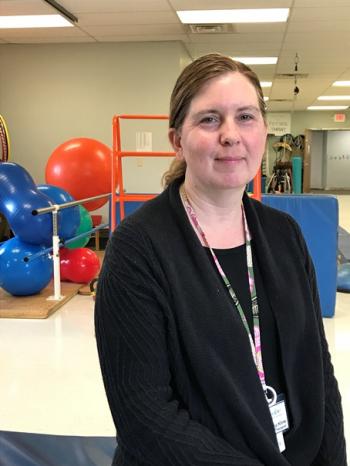
She had been on a similar trip to Africa a few years ago and was eager to do another one.
She’s leaving May 19 and will be gone for 17 days. They will visit several different orphanages, working with staff and teachers on best practices for caring for children, including those with special needs.
She will be joined by two occupational therapy professors and a handful of social work and occupational therapy students, all from Elizabethtown College.
“We’ll have a chance to train staff and problem solve and do therapy with kids,” Denisha said. “Most orphanages lack to the staff to provide (an adequate) level of care, and they don’t have the equipment or the building space. We’ll do what we can to help them.”
Another thing Denisha is hoping to do is to take along some supplies to leave with the orphanages, the kids and their families. She’s asking for donated items, particularly adaptive feeding tools like spoons, bowls and cups.
“If we have Schreiber parents whose kids are older and don’t need some of these smaller items, this is a real opportunity to pass them on to families that have a need,” Denisha said. “It might help a child over there learn a skill that will help them be more independent.”
MAKE A DONATION
Do you have adaptive feeding tools that you aren’t using anymore?
Bring them to Schreiber between now and April 26. Denisha Kline would like to deliver the items to the orphanages and families in Vietnam she visits during her trip with Brittany’s Hope.
Contact Denisha at 717-393-0425 ext. 153 or by email at dkline@schreiberpediatric.org to learn more or make arrangements to donate.
Collaboration is central to Schreiber’s mission
September 25, 2018At Schreiber, we love to partner with other community organizations where missions overlap. We have exciting news about two new collaborations to talk about.

The first is about art. Lancaster Artwalk presents its next Artwalk Weekend Oct. 5-7, and there are at least 36 different locations participating.
The vast majority are in downtown Lancaster’s many art galleries and shops, but Artwalk has moved into the suburbs this year by adding a stop at Homestead Village’s Bachman Center, right next to us here at Schreiber.
The Bachman Center will be open for Artsfest 10 a.m. to 5 p.m. Saturday, Oct. 6, and noon to 4 p.m. Sunday, Oct. 7.
The best news: We will submit some 90 pieces of art, all made by Schreiber kiddos, for display at Homestead throughout the weekend.
Art from our preschoolers and day care kids and by clients will be next to works by 11 Lancaster County artisans, including Barry Smith, Doug Good, Barbara Ulmer and Kitty Filling.
Jay Graver, Schreiber’s director of educational services, has been coordinating the gathering of art from Schreiber kids. There’s a chance you could see a piece by Malcolm Corley, a Schreiber kiddo and emerging young artist we wrote about recently.
The schedule at Homestead will also feature pottery and glass-blowing demonstrations (Saturday) and screen-printing by the Thaddeus Stevens STEM Truck (Sunday).
Donations made during the event will benefit the Homestead Village endowment fund. Schreiber is happy to support’s Homestead as they have supported us, through sending volunteers for our Intergenerational Program, their annual Mother’s Day Jewelry Sale and contributing to our special events, like our Gala and the Rubber Duckie Race.

The other collaboration taps more directly into our expertise in providing therapy services for children. In this case, these would be services for some of the most vulnerable children.
The Lancaster County Behavioral Health and Developmental Services is launching a pilot program to serve families that have babies born with Neonatal Abstinence Syndrome. The program could be expanded later to serve families that have other conditions present at birth, including Down Syndrome.
Neonatal Abstinence Syndrome, or NAS, happens when a baby is exposed to drugs in the womb and suffers withdrawl after birth. The condition can cause many serious problems, including low birthweight, breathing and feeding problems and seizures.
The county selected three Early Intervention special instructors to start the program, and one of them is Schreiber’s Catherine Donohue, an early intervention teacher who specailizes in working with kids ages birth to age 3 that have developmental delays.
“They were looking for people who wanted to do this, and I wanted to do this,” said Catherine, who has worked at Schreiber for 13 years. “I’ve always been interested in that hospital connection.”
That hospital connection will make this program different than the work she typically does. Most of the time, Catherine sees kids at home, at day care or here at the Center. For this new BHDS program, the babies will still be in the neonatal intensive care unit, and she will be working with families in their homes.
The teachers will show families “how can they prepare themselves and their home to bring a special needs child home,” Catherine said.
The program calls for teachers to work with biological families and foster families.
“That’s one of the things they were looking for in the teachers, and I’ve done that,” she said.
A Schreiber kiddo grows into a young artist
September 14, 2018Maria Corley recognized pretty early on that her son Malcolm was different.
His paternal grandmother was a child psychologist, so she had experience with what typical childhood development looked like, Maria said.
“She noticed that he lined things up for me,” Maria said. “She saw the speech delays. The eye contact thing.”
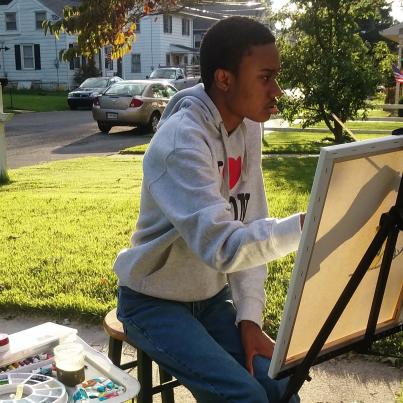
An evaluation led to a diagnosis: PDD-NOS, or Pervasive Developmental Disorder-Not Otherwise Specified.
He was on the autism spectrum.
Malcolm was not quite 4 years old.
He started with Schreiber around the same time, first via home visits through Early Intervention then through appointments at the Center for therapy.
Emily Beddow was his occupational therapist almost from the beginning.
“He was 3, maybe 4, when I started seeing him,” Emily said. “We didn’t know if he’d even be able to write, (because of) the way he held his pencil. He’s really come a long way.”
He’s 19 now, tall and thin, like his mother. And he has artistic talents that started when he was young and have stayed with him into his young adulthood. When he was about 3, he started drawing images from the television show “Blues Clues.”
“Then he started doing Dr. Seuss pictures,” Maria said, “copying from ‘ABC’ and ‘Horton Hears a Who.’ When he started school, he had art class. You could see some talent there.”
Through school, his artistic talent continued to develop. He has had two solo art shows, the first through Millersville University’s Office of Visual and Performing Arts. That led to the second, at the Emerald Foundation’s Emerging Artist series.
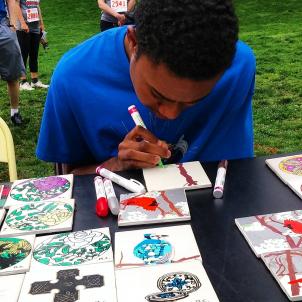
At the same time, he has quietly launched a small business, Malcom’s Tiles, creating hand-decorated tiles that has helped him earn some money. He sold the tiles at the Lancaster-Lebanon Intermediate Unit 13 and at the National Autism Conference and raised enough money to pay for a trip he really wanted to take: to see the Dutch amusement park Juliana Toren.
“He found the park on YouTube, and he really wanted to go,” Maria said. “He wanted to go so he could hug the two mouse mascots.”
The importance of the experience wasn’t lost on Maria.
“I’m trying to impress on him the fact that making money is helpful,” she said. “If he has some sort of a job where he can also do art, that would be good.”
These are the things you think about when you have a child on the autism spectrum who is about to enter the adult world.
He was discharged from therapy a few years ago, but he still is part of the Schreiber family. He still attends Club 625 outings.
“It’s an important social outlet for him,” Maria said. “That’s something he really looks forward to, socializing with his peer group.”
And Emily and Lisa Christoffel, his speech-language pathologist, both keep in touch. They attended his art shows to show support.
“Some kids and some families leave more of an impression on you,” Lisa said. “I saw Malcolm for more than 10 years. He’s a special kid, and his mom has done such a great job with him.”
That feeling is definitely mutual.
“The caring I’ve felt from the people who have worked with him has been remarkable,” Maria said. “I could see the therapists were really invested in him as a person. When I brought him here, I didn’t even know what his voice sounded like, he was that non-verbal.
“From almost having no language at all, he has learned phrases that allow him to communicate and build relationships. He’s come a long way, definitely.”
The journey isn’t over by any stretch. Maria has the questions all parents have about their kids as they grow up: What will happen to him? How will he take care of himself? Will he have friends? It’s all just a so… unknowable with Malcolm.
“I’m not really sure what he thinks about friends and adult relationships,” Maria said. “Making friends is difficult. He’s interested in girls. He seems happy. But maybe he’s lonely and I just don’t know.
“We’ve talked about the fact that I’m not always going to be here, so he needs to learn to do things for himself.”
Maria will keep working with him on that, teaching him how to advocate for himself, helping him grow his art business. And like any other parent, she will hope for the best.
Maria Corley is a performing pianist and organist who plays concerts at venues around central Pennsylvania. She is also half of Duo Chiaroscuro with cellist Sara Male, frequently offering Silence Optional concerts for people on the autism spectrum. She has two children, Malcolm, 19, and a daughter, Kiana, 21. She lives in East Hempfield Township.
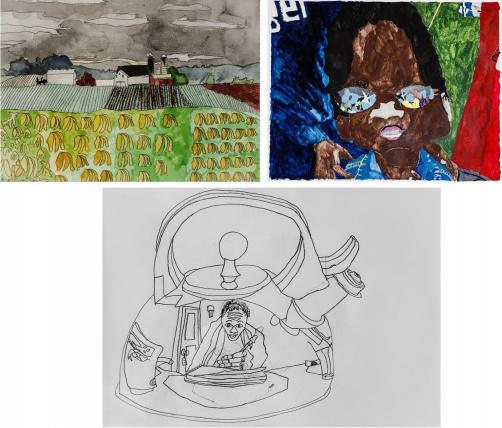
Meet the Grassos, a second generation Schreiber family
July 11, 2018Starting services at Schreiber for two of her children did not create anxiety for Andrea Grasso. She had seen what Schreiber did for two of her sisters.
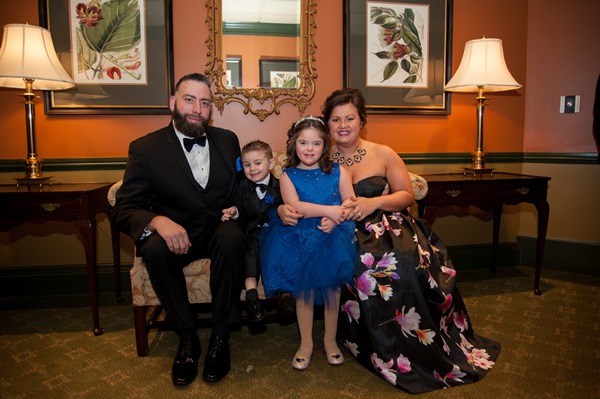
Andrea’s sister Ashley was born with Prader-Willi Syndrome, a rare genetic condition that creates a host of physical and developmental challenges.
“We came to Schreiber almost every day of the week for her preschool and her therapy services,” Andrea said. “It was just something I grew up with. (Schreiber is) something that’s been part of my family since she was born.”
Then her parents adopted Ariel, a little girl who had Down Syndrome. And the visits to Schreiber continued.
Fast forward a few years. Andrea met and married Nick Grasso. Nick was an only child, but that didn’t make it harder to blend in with his new family. It might have made it easier.
“Both of my sisters just love Nick,” Andrea said. “They just gravitated toward him, and he would embrace them with open arms.”
When it was time for Andrea and Nick to start a family, they were both open to children with special needs. For Andrea, it was a natural continuation of the relationships she built with her sisters as a child. For Nick, he saw they had the experiences and the resources that few adopting parents could offer.
So they adopted Mia and Giuliana, and Giuliana has Do
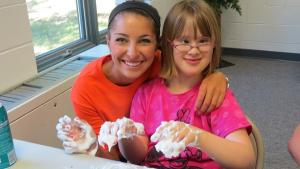
wn Syndrome, just like Andrea’s sister Ariel. And they have two biological sons, Paxton and Jude.
Of the four, it was Paxton’s start in life that proved to be the scariest. They had taken him home from the hospital, but at 10 days something appeared to be wrong. He was crying and fussy and not wanting to eat. At the pediatrician’s office, the doctor saw Paxton have a seizure and sent them right to Lancaster General Hospital.
The medical team there came back with the kind of news that would be any new parent’s worst nightmare.
“The doctor came in and said, ‘He has a Level 3 brain hemorrhage. We need to get him to Hershey. LifeLine will be here in 7 minutes. And you need to get to Hershey as soon as you can.'”
Andrea remembers little of what happened on the trip to Penn State’s Milton S. Hershey Medical Center.
“I know it was a whirlwind of doctors. And I remember pleading, ‘Can I please go with him? Can I please go with him?’ And they said no. And from that point on it was just a blur. We got to Hershey, and he had already been there for 15 or 20 minutes. They had him settled in a room. And he had tubes, and he was just very sick. It was terrifying. As a new mom, you have two young children at home already, and then you have this new baby, and he’s sick and you don’t know why. And you don’t know what caused it. You don’t know what happened. It’s just absolutely terrifying.”

Paxton’s stay in the hospital lasted a month and a half. While he was there, doctors placed a shunt in his brain that connects to a small tube that runs down into his abdomen. The shunt keeps any fluid from building up in his brain again.
He’s a healthy, happy little guy now. But that early bit of brain trauma left him with some sensory issues, which, in turn, create some behavior issues. He attends Schreiber’s S.T.A.R.S. Preschool and has received occupational therapy for a little more than a year.
“He was a different kid when he (first) came in,” Andrea said. “He was shy and very cautious and anxious and nervous. The progress we’ve seen, even over the last six months, is incredible. He is now so much more calm and so much more relaxed. He’s learning how to regulate himself and how to regulate his emotions. He’s learning how to deal with different sensory issues. He’s learning those coping skills.”
The progress with Giuliana has been equally remarkable.
“When we first fostered her, she was a little less than a year old,” Andrea said. “At that point, she couldn’t hold her head up, she couldn’t roll over. She couldn’t do anything. She was already delayed because of the Down Syndrome, but she was also very much delayed because of neglect.”
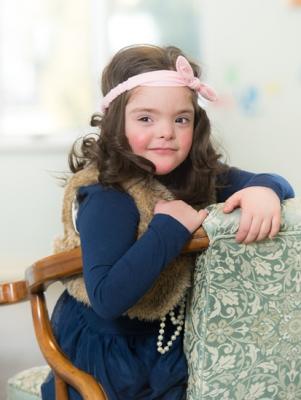
And now, after five years of therapy first through Lancaster County Early Intervention and then at Schreiber, she can do so much more.
“She came (to Schreiber) being not being able to say two words together,” Andrea said. “Now, she’s able to say, ‘I want this,’ or ‘I need that.’ She can say sentences. That’s huge.”
Andrea knows more than most what a difference Schreiber can make in a child’s life. She saw it with her sisters. She’s seeing it now with her son and daughter. For many families, this is one of the few places, maybe even the last place, where they can have hope. Hope that a son will live a full life free of anxiety, or a daughter will learn to talk.
“Families with children with disabilities, they hang onto (Schreiber),” she said. “People from the outside need to see what happens here. They need to see how remarkable this place is and the incredible things that come out of here.”
Shorter wait times are a boost for Marin family
October 27, 2017It took three years from the time she was referred until Luis was finally able to start receiving services in 2013. That’s how long the wait times were for speech therapy.
With her second son, Kevin, doctors detected hydrocephalus during the pregnancy, and he was born in 2013 with his own set of complications.
At 14 months old, when it was time for him to begin services at Schreiber, Velveth said Kevin was able to start almost immediately.
“Very different,” Velveth said. “I’ve told friends to come here for services, and they got right in, too.”
Whether the wait has been long or short, Velveth said the benefits of coming to Schreiber have been the same: amazing.
With Luis, at the time of his diagnosis at age 3, he was nonverbal. By the time he started at Schreiber, when he was 6, he still wasn’t speaking.
“‘Mama,’ ‘Dada,’ that was it,” Velveth said.
He started in Speech-Language Therapy with Barbara Miller — “Miss Barbara,” Velveth called her.
“She started working with him,” she said. “After two or three months, we could see he was paying attention and starting to understand directions. … Then he started saying things. Probably when he was 7, he was speaking.”
Luis is in fifth grade now, doing well in a classroom for students with autism.
“He’s a good kid,” Velveth said. “He’s learning to express himself. He gets along with other kids. He has started to draw and have an imagination. Miss Barbara is the angel that opened the door.”
“Doctors said he’d never walk or eat by himself,” Velveth said. “When we started here, he couldn’t sit. He would just lay in bed.”
He began his physical therapy at 14 months with Lisa Stachler Volk, who showed Velveth how to help Kevin sit and how to massage his legs to help improve his muscle tone. At 18 months, Kevin started to roll over. Then he was fitted with braces and started learning to stand.
He’s 4 now, and he walked from his stroller back to a recent therapy session with no assistance, although he still wears a brace to support his weaker left side. He also receives occupational therapy to reduce his anxiety about walking on different surfaces. His brain had difficulty processing going from grass to the mulch of a playground, for example.
“He used to cry and cry and wouldn’t do it,” she said. “Now he can do it. All these little things he’s doing, like going down a slide, they’re normal for other kids. They’re so amazing for us.”
She has seen him progress in other ways, too. He used to be anxious about different food textures and would only take liquids; now he’s learning to chew. He’s much calmer and more confident. He sleeps better.
All of which is to say: Schreiber and the Marin family found each other at the right time.
The Extraordinary Give is coming
October 5, 2017UPDATE, 10/23: The first 500 visitors to light one of our luminaries will receive a free Stroopie from Lancaster Stroopies. If you haven’t had one of these, yet, don’t wait. Come to Schreiber on Nov. 9, light a candle and get a Stroopie.
UPDATE, 10/12: We confirmed that we will have our Extra Give party at the Federal Taphouse, at the corner of Queen and Chestnut streets, and just two blocks from the big Extra Give party at Lancaster Marriott at Penn Square.
UPDATE, 10/19: We will be at the Federal Taphouse throughout the day on Nov. 17, starting when they open for lunch at 11:30 a.m. When you are out and about downtown that day, stop in for lunch, dinner or drinks, and take a minute to donate to Scheriber. FM97’s DC will be on hand to play music from noon to 6 p.m. If you come by after work, we’ll have live music by Jen and Brad Rhine from Blue Sky Falls from 6-7, followed by MOE Blues from 7:30-8:30.
UPDATE, 11/16: We gratefully acknowledge support from three companies providing Business Matches for this year’s Give: Atlee Hall, Mid-Atlantic ProTel and Medisys Solutions.
Step 3: Remember to give extra during the Extra Give. Your past support has meant so much to us, but the demand for our therapy services continues to surge. Every dollar you donate helps us serve as many children as possible.
Please consider donating to Schreiber during the Extra Give on Nov. 17. When you give extra, extraordinary things happen.